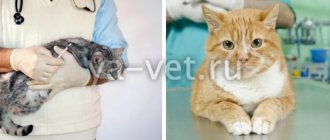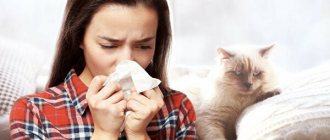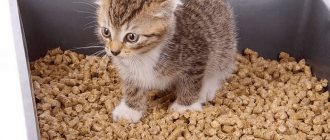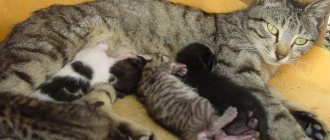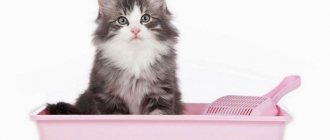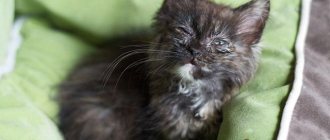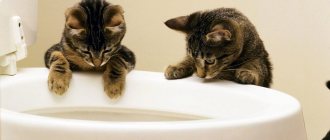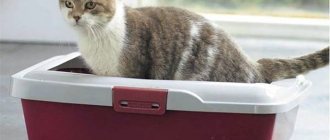Diarrhea in a kitten requires slightly different treatment than in adult cats, and besides, the animal’s immune system is not yet formed, which must also be taken into account. Do you want to know why kittens get an upset stomach and how to treat this condition? Then be sure to read this article to the end! There is a lot of useful and interesting things for all owners of these furry little balls. Remember that with diarrhea, self-medication is strictly unacceptable.
Diarrhea in a kitten: causes
There are many reasons for diarrhea in kittens Even mild stress can lead to diarrhea, which causes significant discomfort.
- Possible reasons why a kitten has diarrhea:
- Fatty foods, unsuitable food - all this can cause stool upset.
- Cats, as a rule, love to lick themselves; they are quite clean. However, this behavior can lead to parasite infestation.
- These bacteria can also be found in raw meat or fish.
- Diarrhea in a kitten can also be provoked by severe stress, for example, a visit to a veterinary clinic, or moving to a country house or another place of residence.
- Poisoning or eating low-quality food can also cause distress in a one-month-old kitten.
- Long-term treatment with antibiotics also disrupts the animal’s intestinal microflora.
- Feeding raw meat products can cause diarrhea with mucus in a kitten. And salmonella, which is contained in meat products that have not been heat treated, can enter the body. As a rule, such bacteria pose a fairly serious threat to the fragile animal’s body.
- If a kitten has bloody diarrhea, this is a direct threat to the life and health of the animal. Not only does dehydration occur due to blood loss, but the body also loses many useful substances that are washed out through feces.
- Diarrhea can also occur due to a sudden change in climatic conditions. Let's say you decide to relax and take your animal with you on a trip. At such a tender age, you should not allow such stressful situations.
- Changing food can also cause diarrhea and diarrhea. For example, if the breeder fed the baby natural food, then in this case you should not suddenly switch him to drying, no matter how impatient you are. Do it gradually.
However, the true cause of diarrhea cannot always be determined.
. And in this case, you have to deal with such unpleasant symptoms as frequent loose stools and pain in the stomach. The kitten seems to be hunching over, trying to get rid of unpleasant sensations.
Diarrhea in a kitten: color of feces
During an intestinal disorder, you should also pay attention to the color of feces. This will help you find out what actually caused the disorder.
- What color can a kitten have diarrhea and what does it mean:
- The color of the stool is black and even mixed with blood? This can mean a wide variety of serious diseases, such as panleukopenia or enteritis. Such conditions should never be treated without a veterinarian.
- A yellow tint of diarrhea may indicate dysbacteriosis or inflammation of the stomach.
- Green diarrhea with a putrid odor, coupled with fever, may mean the development of putrefactive microflora. In this case, you need to call a doctor at home as soon as possible and not waste precious time searching for information on the request: “The kitten has diarrhea, what should I do?” It is possible that the data may be inaccurate.
When calling a doctor at home, be prepared to inform the dispatcher about the color of the stool. This is very important for making the correct diagnosis, as well as choosing treatment tactics. For a speedy recovery, the owner needs to monitor his pet throughout the day, remembering the consistency of the stool, as well as the pet’s behavior at the moment.
Diagnosis and treatment
Cat owners may encounter eating disorders in their pets frequently. The appearance of blood in the stool requires contacting a veterinary clinic for help. Failure to contact a specialist in a timely manner may result in the death of the animal.
Giving any medications without a veterinarian's prescription is not recommended. Especially drugs that are intended for humans.
Otherwise, the wrong dosage of the drug can cause intoxication and lead to serious complications.
Bloody diarrhea can be caused by all sorts of pathologies. Therefore, the doctor prescribes a thorough diagnosis and only based on the data obtained, develops a treatment regimen. Appointed:
- general clinical analysis of blood and urine;
- biochemical panel - a necessary analysis for diagnosing problems at the cellular level;
- Ultrasound examination of internal organs - allows you to identify possible disorders, intestinal blockage, tumor processes in the digestive tract.
If the cause of disturbances in the functioning of the body are minor factors, light maintenance therapy is sufficient. First of all, the patient is prescribed a starvation diet. In some cases, fasting for more than 12 hours allows you to cope with stool disorders even in the absence of drug treatment.
After fasting, it is recommended that the animal be given food in small portions. Feed or natural food should be light, consisting of low-fat foods. At first, it is advisable to give your cat boiled rice and chicken breast. Then transfer to special food. If blood in the stool is caused by an allergic reaction, the diet must be selected taking into account all the features.
An important part of therapy is the administration of probiotics. With any digestive disorders, there is an imbalance of microflora in the intestinal tract. Probiotics, due to the content of beneficial microorganisms in them, normalize the balance, bringing the digestive process back to normal. Probiotics are prescribed both while taking antibiotics and after completing a course of antibiotic therapy. .
The amount of fluid consumed during treatment should be increased. But only if there are no problems with the cardiovascular and renal systems. Maintenance therapy is also carried out using glucose solution, saline and Ringer-Locke solution. The prescription of infusion solutions and their administration are carried out in a veterinary clinic.
General therapy for diseases of the digestive system is as follows:
- Introduction of antimicrobial agents and drugs with antiparasitic effect. The course of treatment and dosage is determined by the attending physician, who knows the type of pathogen and is able to select a sensitive antibiotic. Self-prescription of treatment can cause complications and neglect of the pathology.
- Medicines to relieve inflammation, as well as medicines that stimulate the immune system. Increasing immune status has a beneficial effect on the functioning of the entire body, increasing its resistance to various infectious diseases.
- Diagnosed tumor processes are treated exclusively by surgery. Chemotherapy is then prescribed. A deficiency of cyanocobalamin (vitamin B12) found in a cat is eliminated by administering the drug. In advanced cases, injections of vitamin B12 are prescribed, since the intestinal mucosa is not able to absorb the necessary elements supplied with food.
Depending on the type of disorder, the doctor makes a further prognosis. It is best to start treatment at the initial stages of the disease. Otherwise, the prognosis will be cautious or unfavorable.
Is diet important in treating a symptom like diarrhea in a kitten?
Diarrhea in a kitten is a consequence of a disorder of the gastrointestinal tract . In this regard, you simply need a healthy diet with certain restrictions, which will help normalize the functioning of the stomach and intestines as a whole.
- Basic nutrition principlesif the kitten had diarrhea:
- Eliminate fermented milk products from your diet.
- Do not feed from the common table.
- Feed only fresh foods.
- Feed with boiled chicken and rice, you can solder the rice solution, it has a strengthening property.
- To avoid dehydration, you can also give your four-legged friend any medications that will help prevent this. For example, magnesium sulfate or just drinking plenty of fluids.
However, remember that if a kitten has bloody diarrhea , diet alone will not get rid of it. Serious research from professional doctors will be required
. It should be remembered that kittens are weaker than adult animals, and therefore it makes sense to seek medical help as soon as possible.
- There are several reasons why you should definitely contact a veterinarian for help:
- The first argument is competent doctors.
- The second argument is the possibility of a specialist visiting your home, which is very valuable when a kitten at the age of 2 months has diarrhea. A trip to the veterinary center would be unnecessary stress for him, which is now completely unnecessary for the pet.
- The third argument is the professional approach of doctors to their work.
Causes of bloody diarrhea
Diarrhea is a defense mechanism of the body in which toxins and foreign substances are evacuated from the intestinal lumen. Diarrhea is a common symptom that occurs with many diseases:
- the transition to an adult diet is too fast for a kitten;
- sudden transition to dry rations;
- quick inclusion of a new product in the diet;
- sudden change in diet;
- overfeeding;
- allergies to medications;
- severe stress;
- food allergies;
- viral infections;
- bacterial infections;
- helminthic infestation;
- kidney and liver diseases;
- hyperthyroidism;
- intestinal obstruction;
- bowel cancer;
- diabetes.
As you can see, diarrhea indicates many diseases, but the presence of blood in the stool is much less common. Blood can enter the intestinal lumen in several ways:
- Violation of vascular permeability. This pathology occurs in some viral diseases (they are rare), as well as in poisoning with pesticides. Microscopic hemorrhages in this case will be on many mucous membranes, and not just in the intestines.
- Erosion, intestinal ulcers, microcracks. This type of damage occurs in most cases. The culprit may be worms, a stomach ulcer (due to stress), a foreign body in the intestinal lumen,
- Intestinal perforation. In this case, the integrity of the gastrointestinal tract is disrupted, and a large amount of blood is released into the intestinal lumen. In such a situation, the greatest danger is not the cause, but the hole itself, since through it the animal can lose a lot of blood and die from it.
It should be remembered that when blood leaves the stomach or small intestine, the stool turns red as the hemoglobin has time to be digested. Blood itself, in the form of streaks or liquid, will be found in the stool if bleeding is observed in the large intestine or in the last parts of the small intestine.
Doctors on the staff of “I-VET” to answer why a kitten has diarrhea and in other situations
The veterinary is one of the few in the capital that can boast of having highly specialized specialists. We have the following professionals in our arsenal:
- gastroenterologist;
- dentist;
- gynecologist for dogs and cats;
- ratologist;
- ophthalmologist;
- neurologist;
- nephrologist;
- many other specialists who are ready to help with the most exotic animals that can only exist on our planet.
Such a variety of specialists will allow you to receive first-class assistance at any time. Even if you call us late at night, specialists will arrive promptly, within 40 minutes maximum, and help solve all problems related to your pet’s health as quickly as possible.
Many consider calling a veterinarian to your home a fad for the rich, however, for example, with diarrhea, this can be an invaluable help that will help quickly, easily and safely for others to help your pet.
How long can diarrhea last?
global $ads_google; //data-ad-slot=”2475549904″ $ads_google = empty($ads_google) ? false : true; ?> if ($ads_google == false) {?>
$ads_google = true; ?> } ?>
Duration of diarrhea with a frequency of 2-3 times a day can very quickly lead a kitten to severe dehydration. Replenishing lost fluids at home can be challenging. Duration of up to three days is critical; it is better not to wait so long and consult a doctor.
Diarrhea in a kitten: what to do before the doctor arrives
- First of all, do not give your kitten serious medications, for example, painkillers, which can only disrupt the overall picture of the disease.
- Do not disturb the kitten or play with it against its will. Be extremely careful with him.
- Clearly explain to your household that it is better to leave the animal alone, it is already unwell.
- Do not give forbidden food, no matter how the kitten asks, however, it is quite possible that he will not have an appetite at the moment.
- Since veterinary care will be provided at home, you should be prepared for different situations and prepare the premises for the doctor's arrival.
- The doctor knows better what tests and procedures should be done. Therefore, the owner is recommended to know the address of the nearest pharmacy, both human and for animals, where he can buy all the necessary things and medicines.
Causes and associated symptoms
The causes of bloody diarrhea in cats are:
- bacterial diseases (for example, salmonellosis);
- viral infections (feline leukemia, “feline distemper”);
- tumors;
- parasites (roundworms, tapeworms);
- foreign bodies;
- change in diet;
- food allergies;
- eating grass;
- food poisoning;
- increased levels of thyroid hormones;
- use of medications;
- toxoplasmosis;
- gastroenteritis.
Bloody diarrhea may be accompanied by vomiting, fever, and lack of appetite. The animal becomes lethargic. The nose is dry and warm to the touch.
The kitten has yellow diarrhea
If the diarrhea is yellow in color, then the kitten’s feces move too quickly towards the exit, but there may be enough reasons for this, namely the presence of:
- infections;
- worms;
- allergies;
- lactose intolerance.
Normally, bile with yellow bilirubin should enter the intestines. As stool passes through the intestines, digestive enzymes cause bilirubin to turn into brown stercobilin. With diarrhea, peristalsis is disrupted and increased, so the transformation process does not occur.
In addition, the kitten may have jaundice, in which case there is too much bilirubin in the stool, which is why it is yellow.
How to treat
Here's how to help a child with diarrhea of this color: first you should take a blood test and check the liver. At the same time, the cat’s diet is adjusted to normalize stool quality.
Kittens are not allowed out of care at first, because this causes dehydration, which can end in the most disastrous way. The water should be nearby, clean and fresh! Drink only boiled water to avoid the development of secondary infection.
Each act of defecation should end with washing the base of the tail with soapy warm water - bilirubin can irritate the skin. And if helminths are added to everything, then in this way the owner washes off their eggs.
If you are overfeeding your cat, you can add pumpkin puree to the food, the dosage is a teaspoon, three times a day.
Vaccinations for diarrhea cannot be carried out, even if the calendar date has come!
The kitten has a bloated belly and diarrhea
Bloating with diarrhea is formed due to flatulence, less often due to overeating. This combination is caused by errors in the preparation of the kitten’s diet, which needs to be fed properly. Tender stomachs simply cannot digest adult food! As a result, food accumulation occurs, indigestion leading to diarrhea, flatulence and vitamin deficiency.
Worms also cause bloating; if deworming is not carried out, then this is the first thing that should come to the owner’s mind. If they exist, and the animal is not spared from such “neighbors,” then the death of the baby is quite likely. It is better to carefully study the material about parasites in cats and kittens, and not return to this problem.
If the kitten's tummy is swollen, it is better to go to the veterinarian, who will rule out serious illnesses and advise about loose stools.
What to do
If the cause is overeating, then it is important to adjust the diet itself and the portion size.
When the cause is parasites, then such a baby needs a certain dose of medication, and it should be agreed upon after examination at a veterinary clinic with a specialist. Self-treatment is fraught with violations in dosage and incorrect approach to the treatment regimen.
Flatulence appears as the kitten grows; if the diet is improved, the problem will quickly go away. The combination of loose stools and flatulence is painful; it is better to help the baby with activated carbon or enterosgel, while reviewing the diet. The coal tablet should be cut into 4 parts and mixed with water.
Detailed description of the study
Procalcitonin is a protein molecule. Normally, it is produced in the cells of the thyroid gland. It produces the hormone calcitonin. Procalcitonin is involved in the regulation of phosphorus and calcium metabolism and prevents bone fragility. Normally, its amount in the blood is minimal.
When bacteria enter the body, biological substances that cause inflammation (cytokines) - interleukin-6 and tumor necrosis factor - begin to be produced. They, together with bacterial toxins, stimulate the formation of procalcitonin in atypical places - the liver, kidneys, fat cells and its entry into the blood. In response to viruses, a significant increase in the indicator does not occur, so the molecule is a specific marker of bacterial infection.
Procalcitonin increases within a few hours after bacteria enter the body and disappears within a day. An increase in procalcitonin in people with severe infections occurs earlier than an increase in other markers of acute inflammation (C-reactive protein, ESR), which is important for timely diagnosis. It should be borne in mind that procalcitonin makes it possible to assess the body’s response to infection, but not to determine the specific pathogen. Blood cultures are used for this.
Procalcitonin plays a special role in the early detection of sepsis. This is a life-threatening condition in which there is an inadequate response of the body to infection. Mandatory criteria are the presence of an infectious focus with signs of damage to several organs. Most often, sepsis is combined with a systemic inflammatory reaction, the characteristic manifestations of which are changes in body temperature, an increase in respiratory rate and heart rate.
A procalcitonin test is used to determine the risk of a bacterial infection against a viral background. It is important to monitor the dynamics: at the beginning of the disease, when there is only a virus, the value of the indicator will be within normal limits.
There are other factors that cause an increase in procalcitonin in the blood. It can be physiological in newborns in the first two days and short-term with extensive injuries and burns. The level also increases with certain tumors, fungal infections, and circulatory failure.
A special role of the procalcitonin test is the rational use of antibiotics. The value of the indicator directly depends on the activity of the infection. Based on the dynamics of its decrease or increase, you can adjust your medication regimen. This is important in the context of growing antibiotic resistance in the world.
Determination of procalcitonin levels is an important indicator in the diagnosis of bacterial infections. The analysis helps diagnose sepsis at an early stage, assess the severity of the condition during monitoring over time, and prescribe adequate drug therapy.
How to help a kitten at home
Proper first aid is very important to avoid further harm to your pet:
- We place the kitten in a calm, warm place.
- We do not feed under any circumstances, even if there is an appetite.
- It is allowed to give water if the animal drinks on its own.
- We do not give any medications without consulting a veterinarian.
- We collect stool for laboratory analysis - this will help significantly speed up diagnosis.
- We take the animal to the clinic - the sooner the better.
References
- Septic complications in obstetrics. Clinical guidelines (treatment protocol), 2021. - 45 p.
- Methodological recommendations Algorithm for the use of procalcitonin during antibacterial therapy (including in patients with complicated forms of COVID-19). — Moscow Department of Health, 2021. — 26 p.
- Kent, A., Maha, A. Procalcitonin in Respiratory Diseases: Use as a Biomarker and guiding antibiotic therapy, 2021. - Vol. 15(4). — P. 296-304.
Medicines and dosage for diarrhea in a kitten
There is a list of medications for loose stools tested by veterinarians and cat lovers.
| Medicine | Application |
| Activated carbon | For diarrhea without serious symptoms. If the baby’s condition is good, then one activated carbon will probably be enough as a medicinal component. |
| Smecta | Secures the chair well. It is safe for the baby's health, but the dosage must be observed correctly. |
| Loperamide | Not the very first remedy, since this is a medicinal product aimed at human use. Dosage accuracy is important. |
| Enterosgel | This is also a drug developed for people, but it also turned out to be useful for the cat’s body. Enterosgel is literally an ambulance for getting rid of toxins during diarrhea, infections, and poisoning. It is best to give the medicine at the first symptoms of the disease. |
| Antibiotics | There are various drugs that inhibit the development of the bacterial sphere; glycopeptides are popular groups; aminoglycosides; chloramphenicol. Only a veterinarian can prescribe such a remedy, indicating the dosage and regimen. |
| Enterofuril | The medicine is not given to the cat until 1 month, after which it will seem magical, because diarrhea can go away in a short time. The suspension is recommended for use by kittens as a more moderate remedy for such a small body. |

